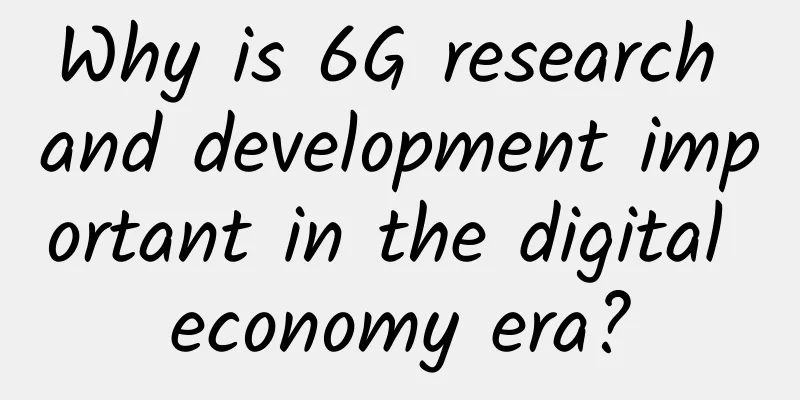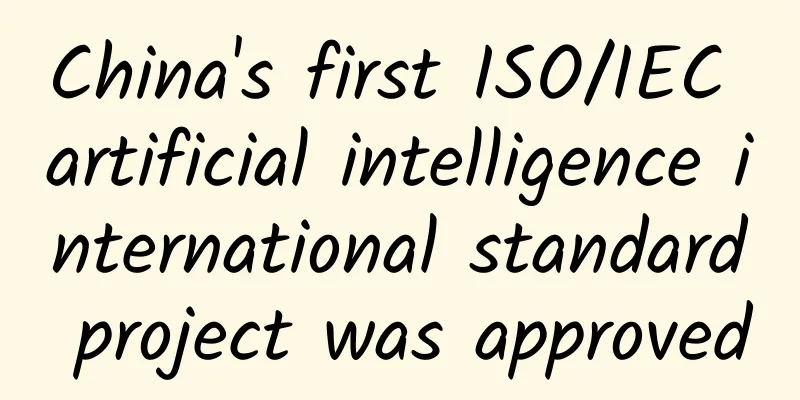The beginning of the 5G era means the end of American hegemony! (In-depth)

|
01 There has been a lot of discussion about 5G recently, but what exactly is 5G? Why is the United States so afraid of Huawei controlling 5G technology? 5G——The only martial arts in the world that cannot be defeated is speed! The world's communication technology has gone through several important eras: 2G, 3G, and 4G: The first generation was analog technology; The second generation is 2G, which realizes the digitization of voice; The third generation is 3G, which is characterized by multimedia communications; The fourth generation is 4G, which marks the entry of communications into the wireless broadband era with greatly improved speeds. The fifth generation is 5G, and its biggest feature is the realization of high-frequency transmission! How fast is 5G? Compared with 4G, 5G is like a race between a tortoise and a hare! 5G's network transmission rate will be 100 times the peak of 4G! This means that in the 5G era, an ultra-high-definition movie can be downloaded within 1 second! The real meaning of 5G is to lay the foundation for the Internet of Everything! If 3G and 4G connect people, then 5G will connect everything. 5G can connect everything in the best way. This unified connection architecture will extend the advantages of mobile technology to new industries and create new business models. In the future world, every object will have sensors, and 5G will be used to exchange data. People, plants, machines, mobile phones, vehicles, household items, etc. will have independent IP addresses. All objects will be controllable, communicate, locate, and work together. Almost everything in the world will be connected, transcending the limitations of space and time. In the future, the main communication between people and things, and between things will rely on data, which is a very objective thing. It will abide by the rules we have already established, which will also save humans a lot of troubles, and people will feel more and more light and relaxed. By then, a more inclusive "big ecosystem" will be formed, that is, everything is connected, which is a state of big network without network! 02 The reason why Qualcomm can be so domineering is because it has many patents in the 5G field. Technology companies all over the world are afraid of Qualcomm. If it is happy today, it will give you patents to use. If it is unhappy tomorrow, it will sue you for infringement and demand additional patent fees. This time, Qualcomm sued Apple in China for this reason! However, Huawei, relying on tens of billions of R&D, finally broke Qualcomm's monopoly in 5G. This is also the first time that China's core communication technology has occupied the highest point! We are willing to sacrifice our lives to bring down the monopoly! The two most competitive companies in the world today are Qualcomm and Huawei, and they are competing fiercely in the formulation of 5G standards! 5G is a national weapon of the future, how can it be controlled by others? In the 5G era, Huawei is likely to dominate the world. In the 3G and 4G eras, there were different network standards such as the United States, the European Union, and China, so there were various mobile phones of different standards, which caused some troubles for consumers. In the 5G era, consumers only need one mobile phone to dominate the world, which means that Huawei is likely to gain a very high international status! The advancement of this core technology will greatly enhance China's development! According to industry estimates, 5G will begin commercial use worldwide in 2020, and a completely new landscape will emerge by then. 03 5G, American hegemony will end completely! The United States is the rule maker of the traditional world. It controls the global currency printing (US dollar) and the flow of goods (TPP: Trans-Pacific Partnership Agreement). But now, the economies of various countries are in a quagmire and urgently need China to inject new vitality. China has now become the hope of the world economy. Don’t forget that China, in addition to Huawei, also has a powerful Internet industry: Baidu pursues the connection of “people and information”, Alibaba pursues the connection of “people and goods”, Tencent pursues the connection of “people and people”, and the common pursuit of BAT is to link “people”, “information” and “goods” with each other, which represent the three major behaviors of human social interaction, perception, and transaction. Once they are connected, they can play a comprehensive effect of 1+1+1 greater than 3. When these three are linked, the effects of fission and fusion can occur, and they can aggregate instantly and have unlimited tension. Coupled with Huawei’s 5G, once the Internet of Everything is realized, the changes it will bring to the world are unimaginable! This is the profound insight of "connectivity, sharing and governance - building a community with a shared future in cyberspace". China is rewriting not only the rules of business, but also the rules of the entire world. The future flow of money, information, and products will all rely on data transmission. 5G will help China govern the world and is also a sharp sword to cut off US hegemony! Today, the United States increasingly relies on war machines and monetary hegemony to plunder the wealth of other countries, gradually moving towards the opposite side of the people of the world and becoming increasingly hollow. China, on the other hand, is actively engaged in the establishment of a new global structure and is willing to share its experience and prosperity with countries around the world. One is the sun at eight or nine o'clock, and the other is the setting sun. History and destiny will surely push China to the top at a reasonable time, and then lead the world into the next higher stage of civilization! Further reading: Who has the strongest 5G capabilities in the world today? Which countries are the most powerful in the 5G field in the world? Naturally, they are the three core groups of the United States, Europe, and China. South Korea and Japan also have certain voices. In fact, looking around the world, we can only see the role of these groups together. To a large extent, the world's 5G market has also been divided up by these countries.
Who is leading the world's 5G standards? The companies that have established and passed 5G standard projects around the world are China Mobile (10), Huawei (8), Ericsson (6), Qualcomm (5), Japan's NTT DOCOMO (4), Nokia (4), Intel (4), Samsung (2), ZTE (2), France Telecom (1), Deutsche Telekom (1), China Unicom (1), Telefonica (1), and Esa (1). According to national statistics, China has 21 projects, the United States has 9 projects, Europe has 14 projects, Japan has 4 projects, and South Korea has 2 projects. The 5G standard project has been divided up by these countries, and other countries in the world basically have no say. Among them, who is the most powerful country, or the important leader of the 5G standard? Of course, China. Many people may not understand why China Mobile has established 10 projects, more than the United States alone. Is China Mobile's technology so strong? China Mobile has played a huge role in the establishment of the world's 5G standard and has greatly influenced the establishment of the world's 5G standard. This is very reasonable and can be analyzed from multiple angles. I think the two most clear reasons are: 1. China Mobile is the telecom operator with the deepest understanding of TDD in the world 2. China Mobile is the operator with the largest number of users and the most complex network in the world China Mobile is the telecom operator with the largest number of users in the world, with 900 million users, which is almost the total population of Europe and more than twice the population of the United States. The user structure is complex, and the user requirements and characteristics are very different. China Mobile has built the best network coverage in the world, which not only covers large cities but also has good coverage in rural areas. Its network construction capabilities are an example for any operator to learn from. In the roadmap of 5G development, Chinese operators represented by China Mobile are more active, have a longer-term vision, and have higher technical requirements. China also has equipment manufacturers such as Huawei, a large number of mobile phone manufacturers, and business developers. In the 5G standards, China has passed the most projects. It can be said that China is at the forefront of the world's 5G standards. Any 5G sub-standard and technology will be difficult to pass without China. The world's 5G standards are not led by one country or one company. Instead, it is the joint efforts of many companies in various countries around the world. Among this group, China has the largest number of companies and has made the greatest efforts. This is something that countries around the world have to admit. Which country has the strongest 5G chip capabilities? Today's communications are a system of computing, storage, and transmission. To do 5G well, both base stations and mobile phones require chips. There is still a big gap between our Chinese chips and the world's first-class level. There are many areas we need to catch up. Which country is strong in 5G chips?
Where does 5G need chips? The core network management system requires computing chips and storage chips, and many devices such as base stations require dedicated management and control chips. Mobile phones need computing chips, baseband chips and storage chips. Of course, a large number of 5G terminals in the future will still need sensor chips. This is a huge system, and China still has a big gap in this regard. Computing Chip Computing chips are needed in servers, core networks, and base stations. In fact, you can understand them as CPUs. In this regard, the United States is the strongest in the world. Intel is Huawei's most important supplier and also ZTE's most important supplier. Except for a few server chips, China has certain products, and the vast majority of computing chips are basically dominated by American companies. Memory Chip Recently, the most powerful country in the world is still the United States, while South Korea and Taiwan Province of China also have a large share. Dedicated chips In addition to general-purpose chips such as computing and storage, there will be some special chips in 5G communication base stations and related equipment. The United States is still relatively strong in this field. Everyone has their own strengths in this field, unlike computing chips, which are monopolized by American companies. Smartphone chips The United States still has the strongest strength in 5G smartphone chips, but China already has Huawei to compete with in flagship products, and Unisoc will also make a difference in mid- and low-end products. Sensors In this emerging field, countries around the world have joined the competition, and it is difficult to tell who is better today. In addition to large semiconductor companies such as NXP, there are also a large number of small and medium-sized enterprises that hope to make a difference in this field. Japanese companies such as Murata Manufacturing have certain advantages. In the field of 5G chips, generally speaking, the United States still has a greater advantage and will occupy a dominant position unless there are major surprises. The overall trend in the chip field is that Europe has declined to a certain extent, and China is increasing its efforts to seek breakthroughs. It is unknown whether the overall situation will change significantly in the next 5-10 years, but China is strengthening little by little, which is an irreversible trend. Communication system equipment R&D and deployment capabilities For 5G to move beyond the lab and become a service that consumers can use, a massive 5G network is needed. This network is made up of a series of products including core network, management system, base station, antenna, tower, etc. We call it a communication system. All 5G networks around the world must have such a communication system to provide services. Whoever has the ability to develop and provide such a communication system is the most powerful proof of 5G. In addition to developing a 5G system, it is also necessary to plan, deploy and optimize the network in combination with different countries, regions, geographies and climates to provide good services. To give a simple example, the network planning and deployment in Hong Kong, China, which has a small land area and a high population density, is different from that in Xinjiang, which has a large land area and a sparse population. This requires a full understanding of the network, computer simulation capabilities, and finally experience! In the 4G era, Huawei basically became the number one in the communications system landscape. It participated in network construction in 176 countries and regions around the world. The quality of its network and its services were well received, making it the world's most powerful communications system equipment manufacturer. Ericsson is second. This once most powerful European system equipment provider has gradually fallen behind Huawei in global share. Nokia has been integrating those collapsed companies step by step under its own umbrella, including Lucent, Siemens, Alcatel, and Shanghai Bell. Nokia used these integrations to occupy the third position. ZTE ranks fourth, and South Korea's Samsung ranks fifth. Of course, Chinese companies such as Datang also participate in the system equipment market. There are also Japanese companies such as NEC, which mainly focus on the domestic market. They lack sufficient competitiveness in the world. In addition to end-to-end system equipment, there are also a large number of manufacturers of antennas, small base stations, repeaters and other related equipment, and China has the largest number of them in the world. Please add the WeChat public account: Industrial Intelligence (robotinfo) Jack Ma is also paying attention It can be said that China still has the strongest comprehensive strength in communication system equipment in the world today. Huawei, ZTE, and China Information Technology (Datang’s parent company) have formed strong comprehensive strength. There is basically no doubt that if there is no political influence on system equipment in the 5G era, Chinese companies will become the world leaders. In the 5G era, the technical strength of Huawei and ZTE is world-class, and there is basically no need for major operators around the world to doubt this. Now ZTE and Huawei are facing pressure from some world powers, which to a large extent also illustrates this problem. They are afraid that Huawei and ZTE will develop and become increasingly in an unsurpassed position in technology. In addition to technology, Huawei and ZTE's products are also very competitive in price. To do a good job in communication networks, one very important thing is to compete with manpower, have people to keep an eye on it, and form a systematic solution to solve problems. In terms of management, the high efficiency of Chinese companies is very representative. For the same staff and the same salary, Ericsson employees only work 35 hours a week, while Huawei employees may work more than 50 hours. For the same products and services, the quotes are very competitive. This is also an important reason why a large number of companies are willing to cooperate with Chinese companies. Mobile phone R&D and production 5G terminal products will not be just mobile phones, but for a period of time, mobile phones will still be an important terminal and will greatly affect the mobile phone experience and 5G development. In today's world, there are only three major players in mobile phone R&D and production: the United States, China, and South Korea. Today, the world's top three are Samsung of South Korea, Apple of the United States, and Huawei of China. Among these three, Samsung and Apple are facing certain difficulties. Samsung's brand has been greatly affected since the battery scandal. Although the global market situation is still good, the Chinese market has shrunk to outside the top ten, and the pressure is huge. Due to lack of innovation, the performance of Apple's new phones in 2018 was not satisfactory. Analysts have adjusted its 2019 sales to around 190 million units. Among the three giants, only Huawei has strong explosive power and good development momentum. After consolidating its position as the leader in the Chinese market, it has expanded to all parts of the world and has performed well in the European, Indian, Middle Eastern, Southeast Asian and South American markets.
In 2020, it is possible that Huawei will become the world's second largest or even the largest market share. In 2020, 5G will be fully commercialized around the world. Huawei has system capabilities and its own chips, so its mobile phones will have good comprehensive capabilities and support 5G. This is obvious. Samsung is likely to be constrained by Qualcomm in terms of chips. The definition and production of flagship 5G mobile phones will be affected by Qualcomm chips, and it will need to compete with Chinese companies for the first launch and 5G capability support. Apple has the biggest problem. It is currently suing Qualcomm. It even gave up Qualcomm's baseband chips for 4G. If 5G still uses Intel's baseband, it is still a question whether Intel, which still needs to work hard to accumulate in the communications field, can well support 5G capabilities and allow Apple phones to perform well. If there are problems with instability in the middle, the damage to Apple may be very fatal. In this regard, among the top three mobile phone manufacturers facing 5G, Huawei is the only one with the best market performance, the most solid technology accumulation, and the upward momentum. In addition to the top three, China has occupied 7 seats in the world's top ten mobile phone brands. Only South Korea's LG can squeeze into the top ten in the world, and China's OPPO, vivo, and Xiaomi are the small three behind the top three. Although Lenovo and ZTE have not performed well in the Chinese market, their global market situation is still good. At present, the first batch of 5G mobile phones in the world are ZTE, Lenovo, OPPO, vivo, Xiaomi, and OnePlus. It can be said that in the field of smartphones in the world, no country can compete with Chinese companies in terms of comprehensive capabilities. Nokia is the only European mobile phone brand left, but it was developed and produced in China a long time ago and is just a brand of the past. In terms of mobile phone R&D and production, China is definitely the world's leading group. Apple in the United States and Samsung in South Korea are also very strong, but in terms of comprehensive capabilities in the field of mobile phones, the United States and South Korea are also difficult to compare with China. 5G China will further consolidate its strength. China has certain advantages in this field. Development and operation of 5G services and applications 5G is not only about networks and mobile phones, but also requires a large number of services and applications. Which country in the world is the most competitive in this regard? This is also an important force that determines whether 5G can be widely used. The development of the Internet around the world, the traditional Internet, is basically copied by all countries in the world from the United States. The traditional Internet businesses were first created and promoted by the United States, and then all countries in the world learned from the United States or directly adopted the American businesses. The earliest traditional Internet businesses that we all know can easily be traced back to the same product master in the United States. In the era of mobile Internet, China has gradually started to catch up with or even surpass the United States. Today, although some of the earliest forms of mobile e-commerce, mobile payment, shared bicycles, taxi services, and food delivery services still have some shadows of American products, the entire product has long surpassed the original products, and some products can be said to have completely surpassed the United States. A typical example is WeChat. The United States cannot be said to have no similar social products. However, the social product eventually developed into a payment platform, which quickly attracted users and increased user experience and scenarios. A social platform eventually developed into a service platform. This aspect is worthy of learning from similar products in the United States. It provides users with efficiency and convenience, and the capabilities of a large number of small programs are incomprehensible to traditional social networks. Compared with products like WeChat, Facebook is completely not on the same level. Another aspect of 5G is that it is the foundation of the smart Internet. It requires the integration of mobile Internet, smart sensing, big data, and smart learning, which requires the research and development and production of smart hardware. Today, the research and development and production capabilities of smart hardware products are the largest in the world, and the strongest in China. China has quickly become the world's number one in products such as smart bracelets, watches, and body fat scales. In China, such products are highly efficient and low-cost. Xiaomi, which currently has a smart home system in China, has a much higher ability to integrate products than Apple and Google. The number of connected products also far exceeds that of Apple and Google. Huawei is also making efforts in this field and is forming a powerful Huawei Smart Selection product series. Through the HiLink protocol, various smart homes are integrated. It does not make all products by itself, but outputs integration capabilities, intelligent capabilities, sales and service capabilities through a platform. The development speed is very fast, and it is expected that the sales volume will exceed 100 billion yuan in 2020. As long as 5G networks are fully deployed, China's smart Internet products will explode and lead the world. This is a prospect that can be seen in the industry. Chinese companies account for more than one-third of the CES consumer electronics show, which also proves China's accumulation in these fields. China's innovation in the field of mobile Internet, the accumulation of funds and talents, and the R&D and production capabilities of smart hardware provide a foundation for the R&D capabilities of smart Internet. The comprehensive strength in this area is difficult to achieve by any country in the world, and this is also the basis for the great development of China's 5G services and applications. Telecom operators’ network deployment capabilities A very important issue for the development of 5G is the network deployment capability of telecom operators. Only when the network is well deployed can ordinary people use it and the business can develop. This requires the network deployment capability of telecom operators. China's three telecom operators are the most powerful in the world. China Mobile has 920 million users, making it the world's largest telecom operator in terms of users. The number of users is almost the same as the entire population of Europe. The number of users of China Telecom and China Unicom also ranks among the top telecom operators in the world. Chinese telecom operators have strong network deployment capabilities. Today, China's 4G base stations have covered 99% of users. The three telecom operators have more than 3.5 million 4G base stations and the total number of base stations exceeds 6.4 million. This number is unmatched by any country in the world. The number of 4G base stations in the United States does not exceed 300,000, and the total number of base stations in India does not exceed 700,000. In terms of quantity, China is 10 times or even more than any other major country in the world. The number of base stations means the network coverage and the quality of the network. Any Chinese who has been abroad will have a general feeling that in many European and American countries, there is no Internet access not far from the city, or the Internet quality is very poor, and the coverage indoors is unstable in many places and the coverage is poor.
In addition to network coverage in cities, the most powerful aspect of China's telecom operators is that the vast remote areas are well covered by 4GM networks, covering 99% of users, a capability that is unmatched by other countries. The network coverage in the vast rural areas has reduced the digital divide, not only allowing the vast rural areas to enjoy cheap services, but also playing a good role in the social and economic development of remote areas. In terms of network deployment, there is a very obvious gap between China and other major countries in the world. We believe that such a gap will also appear in the deployment of 5G networks. This gap in infrastructure will ultimately affect the country's social management capabilities and the efficiency of the entire society. In addition to the number of base stations, China has also chosen the more radical SA independent networking solution in its 5G technology roadmap, while most European and American countries have chosen the NSA solution. The NSA non-independent networking solution means that the main network will still be 4G for a long time, and 5G networking will only be used in core areas. Such a network cannot realize all 5G scenarios and services. It is just a 4G network that has improved the speed in a few places through 5G. The SA solution chosen by China's three telecom operators is to build an independent 5G network from the beginning. This network can not only achieve high-speed Internet access in key areas, but also support low power consumption and low latency capabilities. This provides communication capabilities for the industrial Internet and intelligent transportation systems, and also provides opportunities for the explosion of smart homes. Think about the poor signal in slightly remote places in Europe and the United States, which cannot support 4G. Even tourist attractions such as the Grand Canyon do not have mobile communication signals. You will know why mobile payment services cannot be carried out in the United States and Europe. Because there is no high-quality, high-coverage network, users do not know where to use their mobile phones to pay, so it is better to use credit cards. For a Chinese user, everyone assumes that there will be a network everywhere and can easily make payments, even in a mountain. This is why everyone does not need to carry cash and bank cards at all, because mobile phones are enough. This situation can be truly realized in very few countries in the world. To a large extent, China's suppression of 5G development is not only a suppression of Huawei and ZTE. In fact, to a large extent, it is also the anxiety of European and American elites that after the full deployment of 5G networks, they will lag far behind China in social management capabilities and social efficiency. A US agency once proposed a solution, that is, the US government builds a 5G network and then leases it to telecom operators for use, because for them, relying on telecom operators to build the network themselves is very inefficient and slow, and secondly, it is impossible to provide universal services. Telecom operators use computers to analyze that if the revenue from building base stations in a place cannot offset the construction costs and achieve profitability, they will not build base stations. For Chinese telecom operators, building base stations in the deep mountains and on the edge of the desert will result in losses, and they will not only consider economic benefits but also ignore social benefits. China will definitely build a large, high-quality 5G network as soon as possible, bringing Chinese society to a higher level of efficiency, stronger social management capabilities, and more convenient social services. This will be difficult to achieve for many countries for a long time. This is not only the case in the United States, but also in many European countries, especially in Southern and Eastern Europe. Most telecom operators are facing economic pressure and lack sufficient funds, and the government also lacks the strong will to build a good network. Government support and market capacity 5G is a huge system project. It is a service provided by telecom operators and a new capability for the whole society. It is obviously difficult to achieve high-speed development by relying solely on the investment of enterprises without government support. In many business aspects, laws and regulations, a lot of government support and help is needed. There is a big difference between government support from words to actions, from suppressing foreign companies to supporting the development of domestic companies. The Chinese government has a very clear attitude towards the development of 5G, and actively supports the entire industry to accelerate 5G construction, which can boost the social economy on the one hand, and improve social efficiency and reduce social costs on the other. From research and development to network deployment, the Chinese government's attitude is very positive. Since 3G, the support of the Chinese government has played a good role in the field of mobile communications. In particular, under the personal promotion of the Prime Minister in recent years, operators have carried out large-scale speed increases and fee reductions. Today, China's communication rates are the cheapest among major countries in the world. Cheap rates and wide coverage have brought not only urban areas, but also rural and remote areas into the era of mobile Internet. The role of these government promotions has played a vital role in the development of China's 4G and mobile Internet, and has also achieved immediate results. I believe that the government will also apply these forces to 5G. Of course, governments around the world are also promoting 5G, such as allocating frequencies and issuing licenses in a timely manner, but there is still a big gap in execution efficiency and actual results compared with China. The last force that affects 5G is the market. If a technology or product is developed, a sufficiently large market is an important support for reducing costs and making capital willing to invest. China has a population of 1.4 billion and is the world's second largest economy. Chinese consumers are particularly enthusiastic about new technologies. While Europe is accustomed to using feature phones, Chinese users have a passion for smartphones and 3G and 4G technologies that far exceeds that of other countries in the world. It seems that 4G has been popularized in China overnight. Not only people in big cities and white-collar workers, but also ordinary Chinese have become the backbone of 4G use. When some countries believe that 4G should only be used by white-collar workers, Chinese old ladies use WeChat to set up neighborhood groups to exchange dumpling-making skills, Pinduoduo combines social networking and e-commerce, and smartphones have occupied all groups from big cities to ordinary rural users. 1.5 billion users, this market's explosive power is beyond the comprehension of other countries and regions in the world. While many operators in the world are still using high prices to achieve high income and higher profits, the system supported by Chinese telecom operators is low prices and high income, which is guaranteed by the user base. 5G is a huge system. Whether it is strong or not is not just a point. It needs to be formed by multiple forces to form comprehensive strength. In this complete system, China is in an advantageous position in other fields except for the chip, which is slightly weak. The chip has also broken through nothing. There should be a big breakthrough in the 5G era. In the development of 5G around the world, Europe is strong in the system, the United States is strong in chips, and China is strong in comprehensive strength. It can be expected that with the official commercial use of 5G, the business will first explode, and China will be the world leader. The development of 5G in China is not only about 5G communication technology itself, but also plays a huge role in improving social efficiency, enhancing social management capabilities, and reducing social costs. The impact on the entire social development far exceeds that of 4G, and will greatly affect the strength of the entire country. As technology changes, it will affect the philosophy, morality, and ethics of society, and will also affect the development and progress of thought and culture. |
<<: Two questions to easily understand Riverbed's 2018 and 2019
>>: Analysis of the four major reasons for the 5G "life and death battle" among operators in 2019
Recommend
Analysis of 5G network security issues
The fifth generation of mobile communication tech...
V5.NET new cloud server 30% off monthly payment from HK$42, Hong Kong physical server monthly payment from HK$385
V5.NET has announced the news of new cloud server...
If the Internet connection becomes slow, you don't need to change the router and restart it to restore it to full health
When you use WiFi at home to surf the Internet, i...
One router makes all the appliances in the house smart. Huawei's ecosystem is taking over Xiaomi
At present, among China's smart home brands, ...
How to identify the protocol of an unfamiliar CAN network?
In a CAN network, all nodes share a bus for data ...
European operators can no longer bear the pressure as everyone stays at home. High-speed networks have become a powerful weapon in the fight against the epidemic
Netflix, Youtube, Disney+ and other video sites h...
Traditional Networks vs. IoT Networks: What’s the Difference?
IoT provides businesses with greater visibility, ...
The third anniversary of 5G license issuance: "Three-generation life" has brought prosperity
On June 6, 2022, my country's 5G commercial l...
Brocade Launches New Agile Data Center Portfolio to Help Enterprises Transform Digitally
[51CTO.com original article] In 1992, Andrew Grov...
Illustrated Network: Uncovering the principle behind TCP's four waves, combined with the example of a boyfriend and girlfriend breaking up
In this section, Rui Ge will continue to show you...
Distributed Fiber Optic Sensors Global Market Report 2023
The global distributed fiber optic sensor market ...
Five hybrid video conferencing tips for effective collaboration
[[417444]] When Pixoul, a Dallas-based web design...
Enterprises want to formalize WFH network architecture
Enterprises are transforming their networks to be...
A roundup of the top 10 data center news stories of 2018
The public cloud has not killed the data center, ...









